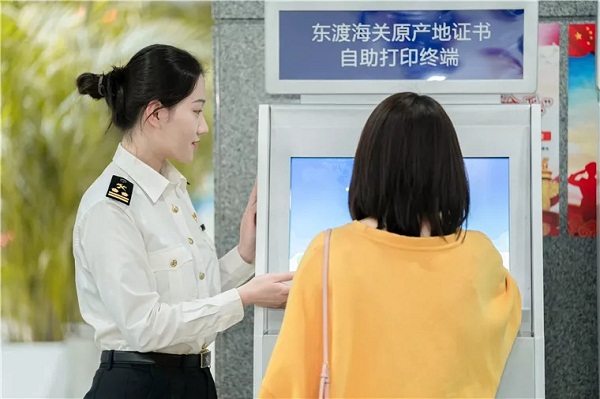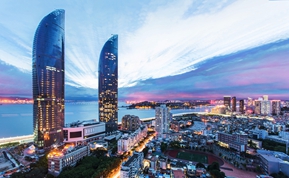Xiamen pilots RCEP agreement

A Xiamen customs worker guides a person to print a certificate of origin. [Photo/WeChat account: touzixiamen]
Xiamen Customs recently piloted the agreement of the Regional Comprehensive Economic Partnership in the Haicang Bonded Port Area and the Xiangyu Bonded Zone in the Xiamen Area of China (Fujian) Pilot Free Trade Zone.
Designated as the pilot customs authority to carry out the RCEP agreement, Xiamen Customs has implemented two policies since the beginning of November.
According to the pilot policies, import companies in these two bonded zones can make amendments to their certificate of origin and be exempted from formalities such as changing orders and re-reporting. These policies are expected to expedite the clearance procedures.
The RCEP agreement will take effect on Jan 1, 2022 in six ASEAN (Association of Southeast Asian Nations) countries - Brunei, Cambodia, Laos, Singapore, Thailand, and Vietnam - as well as in four non-ASEAN countries - China, Japan, New Zealand, and Australia.
Xiamen's foreign trade with RCEP members has increased in recent years. Statistics from the customs show that in the first 10 months of this year, the city's imports and exports with RCEP members increased 22.3 percent compared to last year, while imports and exports with ASEAN countries increased 24.3 percent year-on-year to 131.5 billion yuan ($20.69 billion), making the region Xiamen's biggest trade partner.
Why Xiamen
-

Xiamen is one of the most economically competitive cities in China and was one of the first Special Economic Zones on the Chinese mainland. As a vice-provincial city independently listed on the State development plan, it has provincial-level authority in economic administration and local legislative power. In 2010, the Xiamen SEZ was expanded to cover the entire municipality. Today, Xiamen is a modern and international port city.
